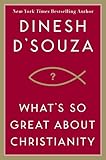

I ended the previous commentary by suggesting that although D'Souza's initial remarks are generally one misuse after another of political rhetoric, he does touch on one valid point.
Dennett had pointed out that all religions have toxic forms, which need to be guarded against, and D'Souza defends religion from this charge by pointing out that there are also toxic forms of atheism.
Being D'Souza, he doesn't put this point anywhere near as clearly, or as reasonably, as I have above.
Instead, he nearly buries it in unsound political rhetoric, conflating social Darwinism with Dennett's scientific beliefs, accusing Dennett of faking his concern about the history of Christian atrocities, and attempting to make the entire issue of toxic religion seem trivial, compared to the dangers of atheism. (He makes a great deal, for example, of how few people were killed in the Salem witch trials, as though they were somehow paradigmatic of the kind of numbers involved in religious violence.)
But once this fog is cleared away, the underlying point remains.
It is true that religion does not have a monopoly on toxicity.
The point is still a political argument—designed to influence the listeners, rather than to address the question. It has no bearing, in any scientific sense, on the existence or non-existence of God.
The idea is that if we believe that atheism is as subject to toxicity as religion is, we will be less inclined to reject religion, whether anything has been demonstrated about the existence of God, or not.
As a political argument, it is sound, however. Atheists really can't go around pointing their fingers at the crusades, and then refuse to notice Stalin.
Unfortunately for D'Souza, the reasonable conclusion from this argument does not go where he would like it to go.
He can point out the atrocities of atheist regimes, but he can hardly deny the atrocities of Christian regimes—or those of all the other religions in the world.
But if this problem of wholesale bloodshed, and torture, and deprivation of basic human rights, happens among the religious and the nonreligious alike, then it ceases to be fodder for political rhetoric about God at all.
It separates the issue of toxicity from the issue of belief.
The question is not whether atheism or religion is toxic, but, rather, what the nature of the toxin is.
Instead of focusing on the differences between Stalinist Russia and the Catholic Church, we should be asking how they are the same.
The answer to this, at least in part, is:
- They both are rooted in a worldview which defines human behavior against a larger battle between Good and Evil.
- They both make a person or a small group of people the representatives of Good, at this point in human history.
- They both require obedience to that group or person, as a measure of the worth of the individual.
- They both divide the world into those who follow that leader and those who don't.
- They both make extensive use of propaganda—both to win new converts, and to keep current subjects from straying.
- They both attempt to control, not only the behavior, but the thoughts of their subjects.
- They both use censorship to this end, as well as a heavy misuse of political rhetoric.
They are both authoritarian institutions, and that—not belief or disbelief in God—is the problem.
In his rebuttal, Dennett claims that Stalinism was a kind of quasi-religion. He seems to be thinking along the lines above when he says that, and you can agree, or disagree, with him, depending on what definition of religion you use.
But whether or not we call such regimes religious is beside the point. There are religions that are not authoritarian, and the problem hasn't really got anything to do with that.
The toxicity proceeds from an authoritarian worldview, and the accompanying structure. It does not require a belief in God, or a disbelief.
As such, it has no direct role in the rhetoric of this debate, but on the larger stage—the cultural battle which this debate is only a symptom of—it is important.
The enemy is not the mild-mannered atheist next door, who doesn't happen to believe in God but would give you the shirt off his back, or the quaker down the street who does happen to believe in God, but would never consider pushing her belief on you.
The enemy is authoritarianism, which will strip you of your civil rights on a moments notice, tell you what to read and think, be satisfied with nothing short of complete and abject slavery.
Dennett is perfectly correct to see the danger of authoritarianism coming from the religious right, in this country, at this time. D'Souza is perfectly correct to point out that next time it could come from the atheist left.
The trick is to keep our eye on the ball, and not on the players.
Next: D'Souza continues his argument.






